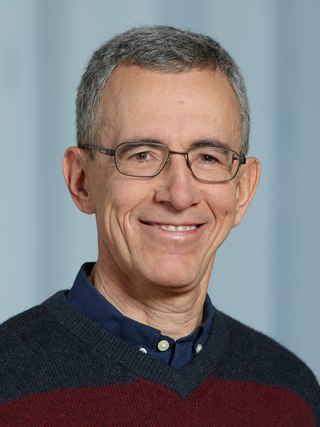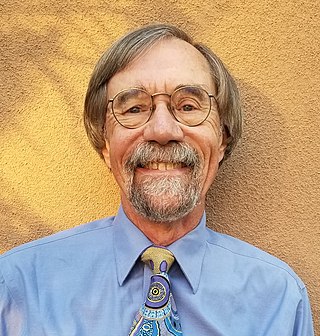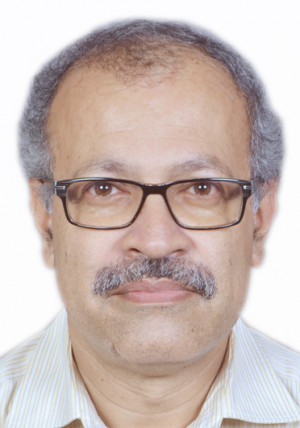Ahmet Turgay Uzer is a Turkish-born American theoretical physicist and nature photographer.

Ataç İmamoğlu is a Turkish-Swiss physicist working on quantum optics and quantum computation. His academic interests are quantum optics, semiconductor physics, and nonlinear optics.

Adilson E. Motter is the Charles E. and Emma H. Morrison Professor of Physics at Northwestern University, where he has helped develop the concept of synthetic rescue in network biology as well as methods to control the nonlinear dynamics of complex networks. In joint work with Takashi Nishikawa, he discovered the phenomenon of converse symmetry breaking. Motter's research is focused on complex systems and nonlinear phenomena, primarily involving complex networks, systems biology, chaos and statistical physics.

Carlton Morris Caves is an American theoretical physicist. He is currently professor emeritus and research professor of physics and astronomy at the University of New Mexico. Caves works in the areas of physics of information; information, entropy, and complexity; quantum information theory; quantum chaos, quantum optics; the theory of non-classical light; the theory of quantum noise; and the quantum theory of measurement. He is a Fellow of the American Physical Society and of the American Association for the Advancement of Science and is a member of the US National Academy of Sciences.

Charles Rogers Doering was a professor of mathematics at the University of Michigan, Ann Arbor. He is notable for his research that is generally focused on the analysis of stochastic dynamical systems arising in biology, chemistry and physics, to systems of nonlinear partial differential equations. Recently he had been focusing on fundamental questions in fluid dynamics as part of the $1M Clay Institute millennium challenge concerning the regularity of solutions to the equations of fluid dynamics. With J. D. Gibbon, he notably co-authored the book Applied Analysis of the Navier-Stokes Equations, published by Cambridge University Press. He died on May 15, 2021.
David Keane Ferry is the Regents' Professor of Electrical Engineering at Arizona State University (ASU), notable for his research in semiconductor devices.
Stephen Ray Wiggins is a Cherokee-American applied mathematics researcher and distinguished educator, also of British heritage, best known for his contributions in nonlinear dynamics, chaos theory and nonlinear phenomena. His wide contributions include Lagrangian aspects of fluid dynamics and reaction dynamics in theoretical chemistry.
Theo Geisel is a German physicist. Geisel is a director at the Max Planck Institute for Dynamics and Self-Organization and professor of theoretical physics at the University of Göttingen. His research is primarily concerned with the behavior of complex systems ranging from theoretical investigations in quantum chaos to nonlinear phenomena occurring in the brain.

Miguel Angel Fernández Sanjuán is a Spanish Theoretical Physicist from Leon, Spain. He is known for his contributions in nonlinear dynamics, chaos theory, and control of chaos, and has published several scientific papers and popular news articles. He has supervised around 20 PhD students in Nonlinear Dynamics, Chaos and Complex Systems.
Naomi Shauna Ginsberg is a Canadian electrical engineer, physicist, and scientist. She is currently an associate professor of chemistry at the University of California, Berkeley.
Celso Grebogi is a Brazilian theoretical physicist who works in the area of chaos theory. He is one among the pioneers in the nonlinear and complex systems and chaos theory. Currently he works at the University of Aberdeen as the "Sixth Century Chair in Nonlinear and Complex Systems". He has done extensive research in the field of plasma physics before his work on the theory of dynamical systems. He and his colleagues have shown with a numerical example that one can convert a chaotic attractor to any one of numerous possible attracting time-periodic motions by making only small time-dependent perturbations of an available system parameter. This article is considered as one among the classic works in the control theory of chaos and their control method is known as the OGY method. He was listed in the 2016 Thomson Reuters Citation Laureates.

Edward Ott is an American physicist and electrical engineer, who is a professor at University of Maryland, College Park. He is best known for his contributions to the development of chaos theory.
Sudeshna Sinha is a professor at the Indian Institute of Science Education and Research, Mohali. She was at the Institute of Mathematical Sciences, Chennai, for over a decade. She works in the field of nonlinear physics. Her work on 'chaos-based' hardware is being developed commercially by the US-based company Chaologix. Chaologix has now been acquired by ARM.

Roberto Morandotti is a physicist and full Professor, working in the Energy Materials Telecommunications Department of the Institut National de la Recherche Scientifique. The work of his team includes the areas of integrated and quantum photonics, nonlinear and singular optics, as well as terahertz photonics.

Abba Gumel is a Professor & The Michael and Eugenia Brin Endowed E-Nnovate Chair in Mathematics at the Department of Mathematics, University of Maryland, College Park. His research, which spans three main areas of applied mathematics, is focused on the use of mathematical modeling and rigorous approaches, together with statistical analysis, to gain insight into the dynamics of real-life phenomena arising in the natural and engineering sciences. The main emphasis of Gumel's work is on the mathematical theory of epidemics – specifically, he uses mathematical theories and methodologies to gain insights into the qualitative behavior of nonlinear dynamical systems arising from the mathematical modelling of phenomena in the natural and engineering sciences, with emphasis on the transmission dynamics and control of emerging and re-emerging human infectious diseases of public health and socio-economic interest.

Soumitro Banerjee is an Indian electrical engineer and former director of the Indian Institute of Science Education and Research, Kolkata. He is known for his studies on bifurcation phenomena in power electronic circuits and is an elected fellow of all three major Indian science academies: the National Academy of Sciences, India, Indian Academy of Sciences, and Indian National Science Academy. He is also a fellow of The World Academy of Sciences, Institute of Electrical and Electronics Engineers, West Bengal Academy of Sciences and the Indian National Academy of Engineering. The Council of Scientific and Industrial Research, the apex agency of the Government of India for scientific research, awarded him the Shanti Swarup Bhatnagar Prize for Science and Technology, one of the highest Indian science awards for his contributions to Engineering Sciences in 2003.
Muthusamy Lakshmanan is an Indian theoretical physicist currently working as Professor of Eminence at the Department of Nonlinear Dynamics of Bharathidasan University. Presently he is the DST-SERB National Science Chair awarded by the Science and Engineering Research Board, Department of Science and Technology. He has held several research fellowships which included Raja Ramanna fellowship of the Department of Atomic Energy, Alexander von Humboldt fellowship, Japan Society for the Promotion of Science fellowship, Royal Society Nuffield Foundation fellowship, and NASI-Senior Scientist Platinum Jubilee Fellowship. On 15 August 2021, he was conferred with the Dr. A. P. J Abdul Kalam Award by the Government of Tamil Nadu.
Frank Charles Hoppensteadt is an American mathematician, specializing in mathematical biology and dynamical systems.

Hui Cao (曹蕙) is a Chinese-American physicist who is the professor of applied physics, a professor of physics and a professor of electrical engineering at Yale University. Her research interests are mesoscopic physics, complex photonic materials and devices, with a focus on non-conventional lasers and their unique applications. She is an elected member of the US National Academy of Sciences and of the American Academy of Arts and Sciences.
Alexander E. Kaplan was a Soviet-American physicist who was known for his work on nonlinear optics and quantum electronics.











